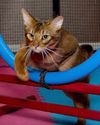
Whether you I have been breeding cats for decades or are a new breeder, establishing and maintaining a relationship with a veterinarian is important. In fact, critically important. No matter how much you know about your breed, breeding cats, and/or cat illnesses and conditions, a partnership with a veterinarian is not just nice, it's absolutely necessary.
Yes, as a responsible breeder it is your job to learn as much as possible about your breed, unusual situations that may arise, and how to recognize a potential problem. But that does not obviate a need for a close relationship with your veterinarian. They are the professionals-educated, trained, and experienced in veterinary medicine and their expertise is essential to the welfare of your cats and the success of your breeding program.
What are the Key Ingredients?
That said, what goes into a great relationship, one where there is a commitment to developing and maintaining a true partnership in the care of your cats? First and foremost, as in most relationships, it is mutual respect and trust.
Just as in any relationship, some simply cannot be fixed. A veterinarian who believes that breeding cats is inherently wrong obviously won't be the best choice for a cat breeder. Conversely, a cat breeder who only wants a veterinarian to dispense medications as requested and to do things their way, regardless of their veterinarian's experience with the situation, probably won't be a good client for a conscientious veterinarian who is committed to providing the best possible care for the breeder's cats and kittens.
Establishing and Maintaining the Partnership
هذه القصة مأخوذة من طبعة February 2023 من Cat Talk.
ابدأ النسخة التجريبية المجانية من Magzter GOLD لمدة 7 أيام للوصول إلى آلاف القصص المتميزة المنسقة وأكثر من 9,000 مجلة وصحيفة.
بالفعل مشترك ? تسجيل الدخول
هذه القصة مأخوذة من طبعة February 2023 من Cat Talk.
ابدأ النسخة التجريبية المجانية من Magzter GOLD لمدة 7 أيام للوصول إلى آلاف القصص المتميزة المنسقة وأكثر من 9,000 مجلة وصحيفة.
بالفعل مشترك? تسجيل الدخول

Holiday Aromatics
Are They Naughty or Nice?

Feline Photographers Part 2
Social media is rife with pictures of our pets, especially cats.

Celebrating the Season With Our Cats
As this writer began work on this project to find holiday stories involving cats, she was amazed to find that there are ELEVEN religious holidays celebrated during December!

How Cats Find Their Owners
A month after losing her beloved senior cat, a woman named Amin Diane was parked on a street at night, waiting for her friend.

Remembering Willa Hawke
Retired CFA Judge Emeritus Willa Hawke passed away August 2, 2024 in Lake Kiowa, TX at the age of 88. She had been a judge for over 50 years before her retirement in 2016.

UP CLOSE AND Purr-sonal
Thoughtful... Caring ... Giving ...Helpful... Committed.

DON'T PUFF AROUND PUFF!
THE EFFECT OF SECONDHAND SMOKE ON CATS

Fluffy Coats
AND HOW TO CARE FOR THEM

Feline Agility?
I Thought Agility Was For Dogs!

Come Fly With Me!
TIPS ON NAVIGATING AIRPORT SECURITY WITH YOUR CAT